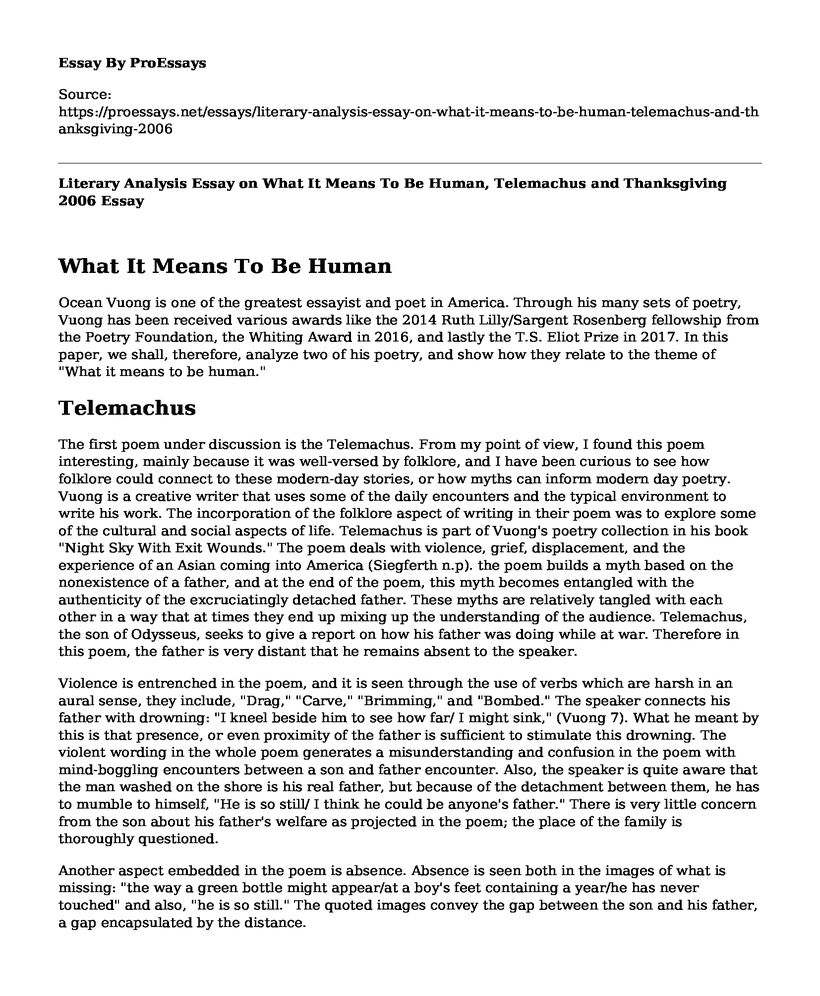What It Means To Be Human
Ocean Vuong is one of the greatest essayist and poet in America. Through his many sets of poetry, Vuong has been received various awards like the 2014 Ruth Lilly/Sargent Rosenberg fellowship from the Poetry Foundation, the Whiting Award in 2016, and lastly the T.S. Eliot Prize in 2017. In this paper, we shall, therefore, analyze two of his poetry, and show how they relate to the theme of "What it means to be human."
Telemachus
The first poem under discussion is the Telemachus. From my point of view, I found this poem interesting, mainly because it was well-versed by folklore, and I have been curious to see how folklore could connect to these modern-day stories, or how myths can inform modern day poetry. Vuong is a creative writer that uses some of the daily encounters and the typical environment to write his work. The incorporation of the folklore aspect of writing in their poem was to explore some of the cultural and social aspects of life. Telemachus is part of Vuong's poetry collection in his book "Night Sky With Exit Wounds." The poem deals with violence, grief, displacement, and the experience of an Asian coming into America (Siegferth n.p). the poem builds a myth based on the nonexistence of a father, and at the end of the poem, this myth becomes entangled with the authenticity of the excruciatingly detached father. These myths are relatively tangled with each other in a way that at times they end up mixing up the understanding of the audience. Telemachus, the son of Odysseus, seeks to give a report on how his father was doing while at war. Therefore in this poem, the father is very distant that he remains absent to the speaker.
Violence is entrenched in the poem, and it is seen through the use of verbs which are harsh in an aural sense, they include, "Drag," "Carve," "Brimming," and "Bombed." The speaker connects his father with drowning: "I kneel beside him to see how far/ I might sink," (Vuong 7). What he meant by this is that presence, or even proximity of the father is sufficient to stimulate this drowning. The violent wording in the whole poem generates a misunderstanding and confusion in the poem with mind-boggling encounters between a son and father encounter. Also, the speaker is quite aware that the man washed on the shore is his real father, but because of the detachment between them, he has to mumble to himself, "He is so still/ I think he could be anyone's father." There is very little concern from the son about his father's welfare as projected in the poem; the place of the family is thoroughly questioned.
Another aspect embedded in the poem is absence. Absence is seen both in the images of what is missing: "the way a green bottle might appear/at a boy's feet containing a year/he has never touched" and also, "he is so still." The quoted images convey the gap between the son and his father, a gap encapsulated by the distance.
Thanksgiving 2006
The second poem is on Thanksgiving 2006. I decided to choose this poem because of how Vuong is able to incorporate the use of imagery. In the poem, a cigarette is, "A razor, sharpened with silence. His jawline etched in smoke," (Vuong 31). As soon as one realizes that the jawline belongs to the man holding the cigarette, and not the cigarette, one is left wondering why it is a razor, and how does silence sharpen it. Consequently, the moods explored in the poem, are similar to those featured in most of Vuong's poems, with the exemption that they are not explored in a unique and incendiary manner (Siegferth n.p). the somber, almost confused mood in most of the poems could be one of his stylistic devices aimed at provoking the thinking process for his audience. In the concluding bit of the poem, the writer claims, "'I am ready to be every animal/you leave behind." But what remains unclear is why Vuong feels like he needs to be an animal, and also it is not clear "Why the animal must be left behind."
Conclusion
In conclusion, by reading various poems of Ocean Vuong, I have learned the importance of appreciating various styles of poetry. It also came to my realization that poetry has a far much deeper meaning than what we just read, and hence it requires someone to be open minded so that they are able to interpret poetry. The two poems "Telemachus" and "Thanksgiving 2006" they relate to the theme of "What it means to be human." They show various emotions, actions, events, and explanations of what actually happens in real life. Most of the features discussed by Vuong like; violence, absence, confusion, are common occurrences in human life and they show us what it is to be human. Poetry is, therefore, an art that should be well used as a tool to educate and influence the nature of human beings.
Works Cited
Vuong, Ocean. Night Sky with Exit Wounds. Copper Canyon Press, (2016).Siegferth, Erin. "Letting Poetry Inside, to Stay." (2019).
Cite this page
Literary Analysis Essay on What It Means To Be Human, Telemachus and Thanksgiving 2006. (2022, Dec 07). Retrieved from https://proessays.net/essays/literary-analysis-essay-on-what-it-means-to-be-human-telemachus-and-thanksgiving-2006
If you are the original author of this essay and no longer wish to have it published on the ProEssays website, please click below to request its removal:
- Research Paper on Herman Melville Literature
- The Changes in Imagery in Amiri Baraka's Poetry in the Beat and the Islamic
- Poetry Analysis Essay on the Ecstasy by John Donne and the Retreat by Henry Vaughan
- English Term Paper on American Slave Narrators
- Essay Example on Loreley and the Sailor: Heine's Poem & Its Controversy
- Macbeth: Examining Traditional Gender Perspectives & Roles - Essay Sample
- Essay Example on The American Dream: Success Through Hard Work and Sacrifice







